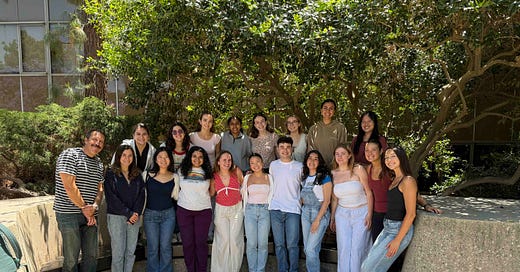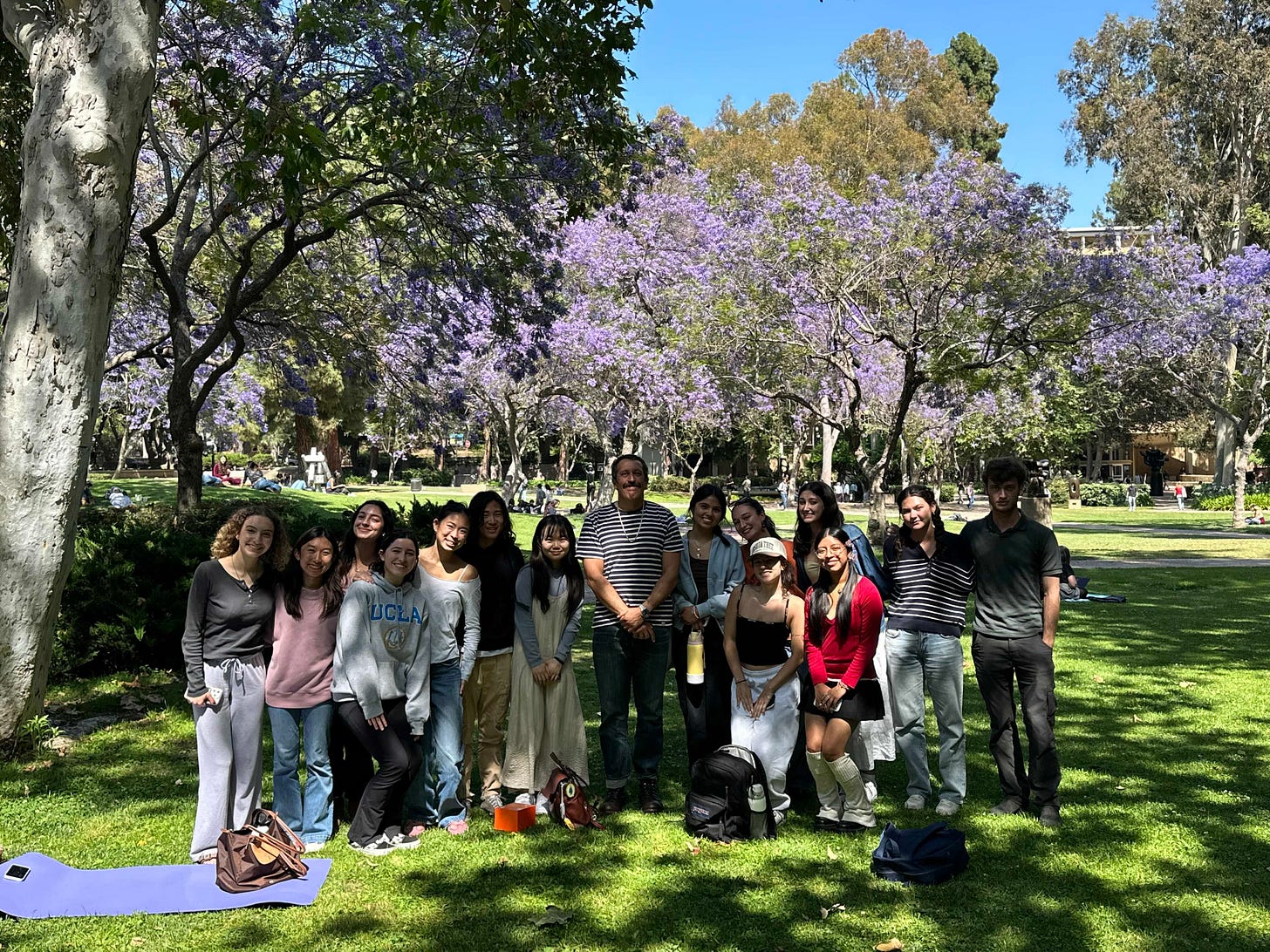Exceptional Student Writing: 'The Death Cafe'
In which Travel Writing student Jennifer C. haunts with another seemingly effortless, almost fairy-tale like story
Two classes, two photos. Another quarter down. I feel accomplished, tired, and ready to grade. (I had my first lifeguard shift yesterday, at the Avenue 23 tower in Venice. It was intense and overwhelming! I have a lot to learn.)
For weeks, I’ve had it penciled in on my schedule to publish that first midterm by a remarkably talented and original writer in my spring Travel class named Jennifer C. But then I read her farewell essay.
While I can still legitimately call C. a “current student,” I want to share that essay with you all. How does she consistently write such spooky and effortless-seeming work? I have no idea. But I sure hope she finds time to keep it up, because her whole approach, style, and set of instincts feels really special and unique. It’s a voice I want to read a lot more from, personally.
You’re all really special tho! These final days of classes are rough. At least this time we had nice weather and could enjoy the out of doors. Stay in touch! All of you!
Douglas Dies
By Jennifer C.
Last night Douglas died in my dreams. We were imprisoned in my 4th-grade classroom, with collars around our necks that would shock us if we tried to escape. I was trudging back after a long day of hard labor, dragging my feet to savor the fresh, at least fresher, air of the outside, when Douglas charged past me leading a bunch of faceless men, all in black combat gear and taser guns. An insurgence. I remember shouting What the fuck, Douglas before collapsing onto the floor in pain. The collar around my neck. I didn’t feel it, of course, but in my dream I was in too much pain to move. I couldn’t see what was happening to Douglas, only that there were black shapes writhing by the windows.
When I woke up, all I could hear in my head for five minutes straight was Douglas. I didn’t see it, but he was dead. How, I didn’t know exactly, but it wasn’t hard to figure it out—tortured or instant death in combat.
The dream itself wasn’t particularly alarming—it’s a scene from a novel I recently finished. The real question is, why was Douglas, a high school classmate I barely talked to, in it? Of all the guys I know, why was he, a tall, wiry blond guy with dimples from the Yukon Territory who was soft-spoken and well-liked, the one my brain subconsciously cast for a role associated with such a violent death?
My most vivid memory of Douglas was him saying that people could strip him buck-naked at his funeral, whatever, he didn’t care. It was our senior year in high school, and we were in the spiritual center, a small wood cabin overlooking the bay that our boarding school was by. I was shocked, although I was careful not to let it show. Beside me, Maggie, the founder of our club Death Cafe, seemed equally at a loss of words. It was like we didn’t know this spectacled guy with freckles on his nose at all.
Maggie was the one who pitched the idea of Death Cafe, a safe space where people could go and discuss death, but not in a suicidal manner or anything like that. She wanted me to lead the club with her, and she even showed me the official wechat accounts of Death Cafe in Shanghai and Beijing to give me a better idea of what they did. I didn’t really have a reason to say no. It was college app season, and I figured something a bit unorthodox might help with my stress levels. Plus, I needed leadership experience to put on my resume, and I bet with some finesse, I could package this into some student-led initiative to drive cross-cultural philosophical discussions.
That day we were in the spiritual center drawing our ideal funerals. I don’t remember what I drew, which is probably for the best. Kaze, a Japanese American from Hawaii who surfed and from what I could figure out was pretty popular in our year, was also a part of our club, which did not make sense to me. He also drew his ideal funeral. Maggie, me, Douglas, we all did, and then we went around in a circle, showed each other our drawings, and talked about it.
Now that I think about it, it’s crazy how our school let Maggie and I run this club for an entire semester instead of scheduling us both for an appointment with the school psychiatrist. How I just went with it without asking Maggie if she was ok. I mean, what did she have to be searching online to stumble across something like this? And six students gathering every week in a wooden cabin above the waters talking about their own funerals for an hour, not one of them with an inkling of mental health training? Maybe we all thought ourselves in control, but in retrospect it did seem an awful lot like a tragedy waiting to happen.
My theory is that the club was Maggie’s closest way of thinking about death without having to say that shit, this thing is actually personal. Of talking about something taboo without being vulnerable. Or maybe I’m just projecting. Maybe to her, Death Cafe genuinely was just the product of her curiosity towards something that will inevitably happen to every single one of us. And if that’s the case, maybe I can feel a bit better about not asking her if everything was ok.
Maybe we all thought ourselves in control, but in retrospect it did seem an awful lot like a tragedy waiting to happen.
Death Cafe fell through the final semester of high school because we couldn’t get enough people to join. Go figure. I was a little disappointed because a semester-long club leadership experience sounded a lot less impressive than a year-long one. I ended up joining a Chinese poker club that the students in the grade below us started. It was fun, easier, lighter. A lot more comfortable than sitting in a wooden cabin thinking about and discussing death.
Douglas’s dream-death brought all of this back—I’d really forgotten about that one semester of leading Death Cafe, and with it, how lost and anxious we must’ve been to cook up something like that. Maggie’s at Yale now; the last time I checked she was having a lot of fun hiking all around America and doing geology or plant stuff? As for me, as disappointed as I was over not getting into Berkeley EECS, I gradually got over it. Now I truly think I would’ve been much less happier if I’d gone there instead of here. I like it here—the weather is nice, the culture is less cutthroat, and I feel free enough to catch my breath and pursue things outside of engineering. I’m graduating in less than two weeks, and at least in this moment, in my room typing out this essay, thinking about reading it aloud tomorrow, I’m the best thing a person can hope to be at the brink of adulthood—happy, or at least hopeful, excited, and a teeny bit nervous. And if there’s one thing I could go back and tell myself, it would be that all that worrying and anxiety and discussions about death weren’t worth it. It does get better, and things will—probably—be fine.




